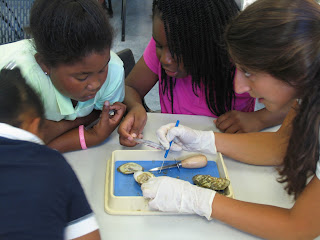The Office of Environmental Education and Public Affairs is pleased to welcome Lauren Pyle as the new Executive Director for Environmental Educators (EENC) of North Carolina. Below is the announcement from EENC's Board of Directors.
Environmental Educators of North Carolina is thrilled to announce the hiring of an Executive Director, Lauren Pyle. A former board member and professional life member of EENC, Lauren has been active in the environmental education community in North Carolina for over eight years. Lauren has worked as part of the education team at the Western North Carolina Nature Center in Asheville, where she wears many hats. She has wrangled teen volunteers, helps the public navigate the online registration system, leads public wildlife demonstrations including feeding otters, and has experience writing grants to fulfill "pie-in-the-sky" programs.
Previously, Lauren worked with youth education at The North Carolina Arboretum, has contributed to strategic planning processes with three different organizations, simultaneously taught college freshman biology/8th grade physical science/telemark skiing during her undergraduate and masters programs at Cornell University, and spent five summers catching bats as a wildlife biologist for an environmental consulting company.
The Board of Directors have been working towards this goal for many years to help build the capacity of our organization, and Lauren is excited to help advance the mission and vision of EENC. The Executive Director position is currently part-time, with the intent to become full-time through additional grant funding. We are so excited to be taking this step to help our organization be a leader in the field of environmental education within North Carolina, the southeast, and the nation.
Please join us in welcoming Lauren. She can be reached at eencexecdirector@gmail.com
EENC Board of Directors






